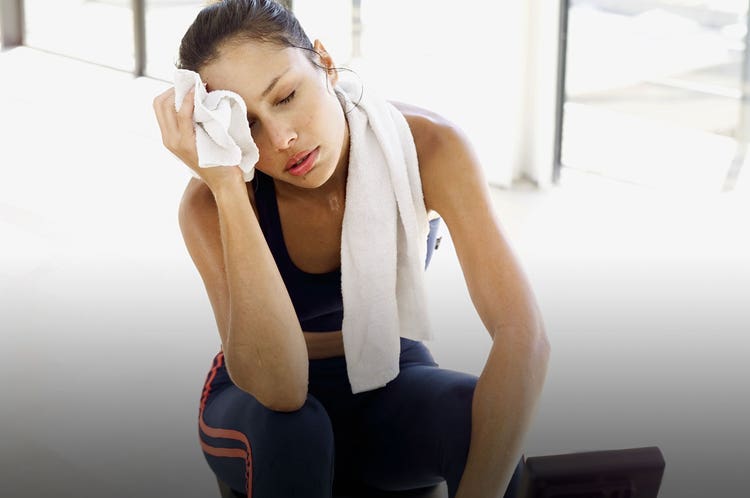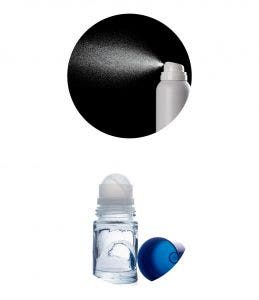Don’t Sweat It

No one wants to be the stinky kid in gym class. Use this guide to find the right product to keep you fresh and dry.
Deodorant or antiperspirant. Are you wondering what the difference is? While they’re a crucial part of everyone’s grooming routine, it’s not a step that we tend to spend a lot of time thinking about. Before you swipe or spray again, consider this expert insight on finding the right formula for you.
Buyer’s choice:
Deodorant vs. Antiperspirant
It’s important to understand that there are two classifications. Essentially, antiperspirants combat sweating, and deodorants target smell. “Deodorants tend to be clear in color, while antiperspirants are opaque and white. Each are developed to address a specific issue,” explains Dr. Terrance Keaney, dermatologist and Dove Men+Care expert. “When choosing a product, do a self-evaluation first, and figure out what problem you’re trying to solve. Deodorants are water-based with fragrance, and antiperspirants usually have aluminum-based formulas, which block sweat.”
How exactly does deodorant work? “Deodorant addresses odor by either masking it with a fragrance, or killing bacteria with antibacterial ingredients,” says New York City-based dermatologist Dr. Whitney Bowe. “It’s the bacteria that cause the odor, because the bacteria that live on your skin basically feed on your sweat, and the metabolites they create as a result are the ones you smell. So, deodorants kill the bacteria, preventing that change from occurring.”
If you suffer from both odor and excess sweat, get a combination product, such as AXE Adrenaline Dry Spray Antiperspirant Deodorant.
Magic formula:

Spray, stick or something else?
Stroll down the deodorant aisle at the drugstore, and the options can be overwhelming. “Overall, no one format is particularly more effective than the other,” says Doug Tomczak, Senior R&D Manager at Unilever. “Rather, it generally comes down to the personal choice and needs of the wearer.”
Tomczak breaks down each formula:
- Antiperspirant gels contain water and alcohol, which can leave a wet and cold feeling on the skin.
- Antiperspirant sticks deliver great wetness protection. But they use waxes and cosmetic oils, which can leave white residue under the arms.
- Powders usually contain ingredients that help your skin feel dry, and may have fragrances to help mask odor. They’re not antiperspirants.
- Wipes include ingredients that typically cleanse the surface of the skin, helping it feel clean and fresh. These aren’t antiperspirants.
- “Cream” is a term often used to describe the clinical product that has the highest level of active antiperspirant allowed by the FDA to deliver great wetness protection.
- Many sprays simply apply deodorant, or a masking fragrance, to the underarm, and these formats can leave a wet feeling on the skin. However, some go on instantly dry and leave no visible residue. The propellants in the aerosol delivery also provide a greater fragrance release.
Gender labels
While the core ingredients are essentially the same, it’s all about the finishing touches when it comes to the difference between products for men and women.
“We listen carefully to the needs and preferences of consumers when we develop personal care products,” Tomczak says. “This means our deodorants are tailored to the unique needs of men and women in both formulation and experience. For instance, our research tells us that women prefer a softer feeling antiperspirant stick, whereas men like a harder stick due to the presence of underarm hair. Men and women also prefer different fragrances, and even the size of the packaging is customized to anatomically fit men and women better.”
Extra protection

Thanks to advances in product development, you don’t have to worry about your deodorant giving out. Many products now offer 24- or even 48-hour protection, like Dove Men+Care Cool Fresh Dry Spray.
Look for “clinical strength” on the label, and it should keep you fresh all day.
“Certain products have specific ingredients or technologies that help them last longer,” says Alyssa Kowcz, Senior Scientist, Unilever R&D. “For example, Degree Women MotionSense Invisible Solid contains technology that provides bursts of fragrance as you sweat and move, giving you longer-lasting protection. The key difference between ‘clinical strength’ products and others on the market is that these typically have the highest level of antiperspirant ingredient allowed by the FDA, giving the maximum wetness protection available.”
Perfect timing

It’s not just about which formula you use, but when you apply it. Deodorant is more flexible; since it provides odor-masking fragrance rather than the tougher task of preventing wetness in the first place, there isn’t as much of a need to build up a protective layer as there is with antiperspirants, explains Tomczak.
“Antiperspirants are best applied at night, before going to bed,” he says. “This allows time for the active ingredient to take the best hold. It’s even okay to shower the next morning, and it will maintain its efficacy so long as you don’t scrub your underarms with particular intensity.”
To maximize protection, Dr. Bowe recommends applying it when the skin is clean, dry and cool, like after a shower. “Those with sensitive skin may want to apply deodorant opposite to their shaving schedule,” she suggests. “For example, if you shave at night, apply in the morning or vice versa.”
Losing streak
When you’re getting dressed in the morning, few things are more annoying than trying to remove those dreaded white marks from your clothing. Those are caused by the residue of some antiperspirants, specifically the wax formulation in some sticks, explains Tomczak. You can switch to a deodorant, which tends to be a clear gel formula, or opt for a dry spray antiperspirant.
“Your best bet is to use a roll-on or a clear product to avoid this dilemma,” says Dr. Bowe. “Also, getting dressed and then applying afterwards will help reduce the deodorant getting all over as you pull your clothes on. If you wind up with these inevitable white marks, you can rub a pair of jeans on the area to get rid of the stain.”
Au naturale
Lately, natural deodorants, like Malin+Goetz Eucalyptus Deodorant and Lavanila Laboratories The Healthy Deodorant, are getting lots of attention. Typically, that means these formulas use materials found in nature and are subjected to minimal processing.
But, keep in mind that they can vary. “‘Natural’ is a buzzword because there is no clear-cut definition to define what is ‘natural’ when it comes to deodorant,” says Dr. Keaney. “A ‘natural’ formula may have untested plants or oils that could lead to irritation or contact dermatitis in some individuals.” Look for deodorants and antiperspirants that have been clinically studied to prevent irritation.
Also, natural formulas typically avoid ingredients such as aluminum. “But aluminum is safe and doesn’t cause cancer, despite what you’ve heard,” says Dr. Bowe. Other experts, such as Dr. Joseph Mercola, would strongly disagree with the statement that aluminum is safe, and advocate instead for methods to naturally decrease body odor through a clean lifestyle, change in diet or use of a homemade natural deodorant.
The good news? As an informed and conscious consumer, you can now safely choose among a plethora of solutions.